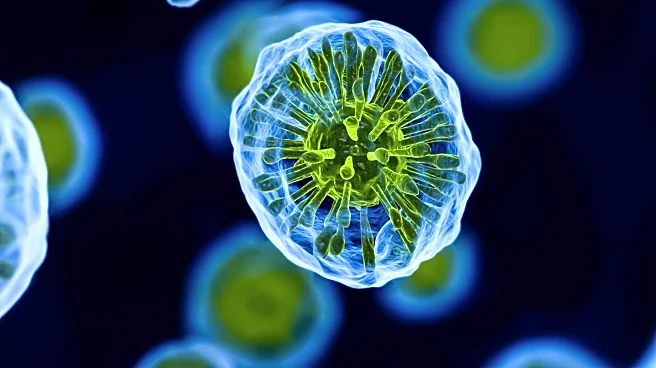What's Happening?
A study conducted by researchers at Wuhan University has uncovered the role of lysosomal acidity in regulating the production of reactive oxygen and nitrogen species in macrophages. Using platinum nanoelectrodes, the team tracked these reactive molecules in real time, demonstrating that lysosomal pH acts as a chemical dial. Acidic conditions favor the production of hydrogen peroxide, while mild alkalinization promotes nitric oxide, peroxynitrite, and nitrite. This precise pH-dependent control shapes immune responses, oxidative stress, and inflammatory signaling, offering insights for therapies targeting macrophage function. The study highlights lysosomes as active chemical modulators, controlling the release and conversion of reactive molecules according to local acidity.
Why It's Important?
The findings have significant implications for understanding immune regulation and developing therapies for conditions involving macrophage function. Dysregulated lysosomal pH has been linked to chronic inflammation, autoimmune disorders, and impaired microbial clearance. By modulating lysosomal acidity, it may be possible to enhance or suppress macrophage activity, offering targeted strategies for treating various diseases. For instance, stabilizing lysosomal pH in aged or immunocompromised individuals could boost pathogen clearance, while controlled alkalinization might reduce oxidative stress in autoimmune diseases. The study provides a deeper understanding of how macrophages balance microbial killing with self-protection, potentially leading to new therapeutic approaches.
What's Next?
Further research may explore the therapeutic potential of manipulating lysosomal pH to regulate macrophage activity. Scientists could investigate the effects of pH modulation on different immune responses and its application in treating specific diseases. Additionally, the study may prompt the development of new technologies for real-time monitoring of reactive species dynamics in immune cells, enhancing the precision of immune regulation strategies. As the understanding of lysosomal pH's role in immune function grows, researchers may identify novel targets for drug development and improve treatments for inflammatory and autoimmune conditions.
Beyond the Headlines
The study underscores the complexity of immune regulation and the importance of understanding cellular microenvironments. It highlights the potential for innovative approaches to modulate immune responses, challenging traditional views of immune function. The research may influence ethical considerations in developing therapies that alter cellular processes, prompting discussions about the balance between enhancing immune function and avoiding unintended consequences.










